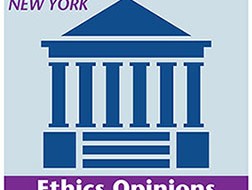Taking Security Interest to Secure Payment of Fees
By Lazar Emanuel [Originally published in NYPRR November 2002]
A New York lawyer who wishes to take a contractual security interest in a client’s property to secure the payment of fees should first determine the answers to a number of questions. The questions are highlighted by two recent developments: (1) On May 31, 2002, the ABA issued Formal Ethics Opinion 02-427 construing Model Rule 1.8(a) and Model Rule 1.8(i); and (2) on Sept. 22, 2002, Judge Joseph C. Teresi of the Supreme Court Albany County decided that a statute extending Part 1400 of the Appellate Division Rules [22 NYCRR 1400.5] was valid under the Constitution [Schantz v. O’Sullivan, 845-00].
Q: What statutes and/or disciplinary rules control the acquisition of contractual security interests in client property?
A: The acquisition of security interests by a New York lawyer is controlled generally by 22 NYCRR §1200.23 [DR 5-104(A)], which deals with business and financial transactions between lawyer and client. In matrimonial actions specifically, security interests are covered under 22 NYCRR 1400.5 and 22 NYCRR 1200.11(c)(2)(iii) [DR 2-106(C)(2)]. The lawyer should also consider ABA Model Rule 1.8(a), Model Rule 1.8(i) and ABA Op. 02-427 (supra).
Q: How do the New York rules differ from the ABA rule?
A: NYCRR 1200.23 [DR 5-104(A)] deals generally with business and financial transactions between lawyer and client. The New York rule differs textually in several material respects from ABA Model Rules 1.8(a) and 1.8(i), which, together, cover the same general issue of lawyer/client business transactions, but refer more specifically to the acquisition of security interests.
New York’s DR 5-104(A) [22 NYCRR §1200.23] reads:
A lawyer shall not enter into a business transaction with a client if they have differing interests therein and if the client expects the lawyer to exercise professional judgment therein for the protection of the client unless…
The rule goes on to require that the terms of the business transaction be fair and reasonable, that the lawyer advise the client to consult independent counsel, and that the client consent to the terms in writing after full disclosure.
ABA Model Rule 1.8(a) reads:
A lawyer shall not enter into a business transaction with a client or knowingly acquire an ownership, possessory, security or other pecuniary interest adverse to the client unless…
In the same way as the New York rule, the ABA rule goes on to require that the transaction be fair, that the client be given an opportunity to consult independent counsel, and that the client give his informed consent.
ABA Model Rule 1.8(i) refers again to security interests, a reference which — as we have seen — is not present in the New York rule:
A lawyer shall not acquire a proprietary interest in the cause of action or subject matter of litigation the lawyer is conducting for a client, except that the lawyer may: (1) acquire a lien authorized by law to secure the lawyer ‘s fee or expenses; and (2) contract with a client for a reasonable contingent fee in a civil case. [Emphasis added.]
The key words are “authorized by law.” This represents a critical change from former Model Rule 1.8(j), which read, instead, “granted by law.”
This change in language was the underpinning for ABA Formal Opinion 02-427 (supra). The ABA Opinion advises as follows:
1. It is not per se improper for a lawyer to take a security interest for the payment of fees earned or to be earned.
2. The acquisition of a contractual security interest in property of the client to secure the payment of fees is a business or financial transaction with the client and is covered by MR 1.8(a).
3. A lawyer who acquires a contractual security in a client’s property to secure the payment of fees must comply with MR 1.8(a).
4. The lawyer may take a security interest in property which is the subject of litigation.
5. Under the amended language “authorized by law,” a lawyer may take any security interest which is legally recognized, not only those which are “granted by law.” Thus, “Liens…authorized by law…may include liens granted by statute, liens originating in common law and liens acquired by contract with the client.” [Emphasis added.]
6. Former Rule 1.8(j) should no longer be applied to prohibit acquisition of an otherwise legally and ethically obtained lien.
7. When a lawyer takes possession of the client’s property to secure payment of the lawyer ‘s fees, he acquires a possessory security interest and is charged with the duty of safekeeping the property. Under MR 1.15(a), the lawyer must identify the property as the client’s property and hold the property “with the care required of a professional fiduciary.”
8. In realizing on the security, a lawyer may receive no more than a reasonable fee plus his costs and legal interest. Unless the client has transferred the property to the lawyer voluntarily, the lawyer may not retain any value in the collateral exceeding a reasonable fee plus the costs of preserving and realizing on the collateral. The excess should be considered property of the client held by the lawyer under MR 1.15.
Reference to New York View
The ABA refers in its Opinion [FN7] to two New York ethics opinions. One of these squarely supports the Opinion’s conclusion that: “Although a fee agreement with a client is not generally considered to constitute a business transaction, the transaction to secure a fee is itself regarded in most state and local bar opinions and court decisions as a business transaction.” [Emphasis added.]
FN7. See, e.g., New York City Committee on Professional & Judicial Ethics Formal Op. 1988-7 (July 14, 1988), which concludes that a mortgage on a client’s home to secure a fee was a business transaction governed by DR 5-104(A), citing Charles W. Wolfram, Modern Legal Ethics, §8.11 at 482 (1986).
What does all this mean for a New York lawyer? Simply this: In light of the ABA Opinion and of NYC Op. 1988-7, prudence would appear to require compliance with the terms of DR 5-104(A) by any New York lawyer who plans to take a security interest in a client’s property to secure payment of his fees. This means that the lawyer should advise the client in writing:
1. That the transaction creating the security interest is a business transaction between the lawyer and the client;
2. That the lawyer and the client may have differing interests in the collateral;
3. That the terms of the transaction are… (make full disclosure of the terms in a way which can be reasonably understood by the client);
4. That the client is advised to seek the advice of independent counsel in the transaction;
5. That the client must consent to the transaction in writing after he or she is satisfied that the disclosure by the lawyer has been full and complete.
Rule in Matrimonial Actions
Special provisions apply to security interests in matrimonial actions. These provisions are contained in 22 NYCRR 1400.5 and 22 NYCRR 1200.11(c)(2)(iii) [DR 2-106(C)(2)].
22 NYCRR 1400.5, one section of an extended rule controlling a lawyer’s conduct in matrimonial actions, provides:
(a) An attorney may obtain a confession of judgment or promissory note, take a lien on real property, or otherwise obtain a security interest to secure his or her fee only where
(1) the retainer agreement provides that a security interest may be sought;
(2) notice of an application for a security interest has been given to the other spouse; and
(3) the court grants approval for the security interest after submission of an application for counsel fees.
(b) Notwithstanding the provisions of subdivision (a) of this section, an attorney shall not foreclose on a mortgage placed on the marital residence while the spouse who consents to the mortgage remains the titleholder and the residence remains the spouse’s primary residence.
These provisions are reinforced by 22 NYCRR 1200.11(c)(2)(iii) [DR 2-106(C)(2)], supra.
Statute Applied Retroactively
Until this year (2002), 22 NYCRR 1400.5 applied by its terms only to security interests in matrimonial matters executed after Nov. 30, 1993. In response to an attempt by the wife of Poughkeepsie lawyer Stewart Schantz to foreclose on a 1986 mortgage executed by a matrimonial client of Schantz and assigned by Schantz to his wife, the legislature enacted a bill that applied Section 1400.5 retroactively. The statute was construed by Judge Teresi in Schantz v. O’Sullivan, 845-00 (supra).
Defendant O’Sullivan moved for an order requiring plaintiff Schantz to cease any steps to foreclose on the mortgage. Schantz asked the court to declare the 2002 statute unconstitutional and null and void. Judge Teresi ruled in favor of the defendant.
Judge Teresi argued that every statute carries “a presumption of constitutionality.” Even in cases involving state interference with a private contract, “deference is to be given to the legislature’s judgment as to necessity and reasonableness of the measure.”
“The State may adopt legislation that impairs a private contract if the state law is to promote a significant and legitimate state purpose, and does not operate as a substantial impairment of the contractual relationship… The legislation seeks to address the ethical concerns regarding matrimonial attorneys who secure an interest in their clients’ homes.”
Lazar Emanuel is the publisher of NYPRR. He is the author of Latin For Lawyers, published by Aspen Publishers, Inc.
DISCLAIMER: This article provides general coverage of its subject area and is presented to the reader for informational purposes only with the understanding that the laws governing legal ethics and professional responsibility are always changing. The information in this article is not a substitute for legal advice and may not be suitable in a particular situation. Consult your attorney for legal advice. New York Legal Ethics Reporter provides this article with the understanding that neither New York Legal Ethics Reporter LLC, nor Frankfurt Kurnit Klein & Selz, nor Hofstra University, nor their representatives, nor any of the authors are engaged herein in rendering legal advice. New York Legal Ethics Reporter LLC, Frankfurt Kurnit Klein & Selz, Hofstra University, their representatives, and the authors shall not be liable for any damages resulting from any error, inaccuracy, or omission.
Related Posts
« Specialization Announcement Requires Disclaimer Notice Time-Barred Counterclaim in Lawyer’s Suit for Fees »







